Students and Teachers Tell All About the TI Codes Contest
Posted 09/30/2022 by Harshal S. Chhaya (@hschhaya)
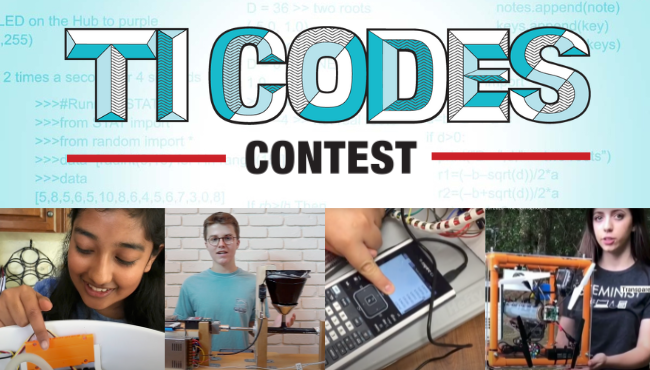
“Involving, innovative, inspiring” — students call it like it is on the TI Codes Contest
For five years we’ve hosted the TI Codes Contest, an annual engineering design challenge for students, where they design prototypes of useful products using TI technology. Each year students are presented with a different themed challenge. They use coding and TI technology to build prototypes of their solutions and then pitch their idea to the world in a final video.
Over the years, students have built designs for space, the environment and, most recently, for pets and animals. The results have been astounding!
We caught up with the students and teachers of the five finalist groups from the 2022 TI Codes Contest to get their feedback and insights into their experiences.
If you have not heard of the TI Codes Contest before, or are not sure if the contest is for you, read on. Their words, enthusiasm and ideas will inspire.
“Thrilling, challenging, exhilarating.” — Stiles Middle School student member

The TI Codes Contest structure — using the engineering design process to challenge student thinking
Built in four phases (pitch, design, build, vote), the contest format breaks up the challenge into attainable steps for the students and teacher (or sponsor). This structure encourages teams to incorporate an engineering design mindset and refine their design as they continue through the different phases of the contest. The design and build stages include a video consultation with a team of TI experts who answer questions and provide valuable feedback to the teams about their design. Students become immersed in a complete product design experience — an incredibly valuable experience from a real-world perspective.
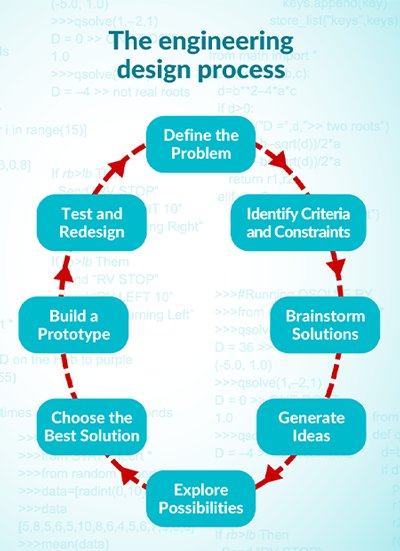
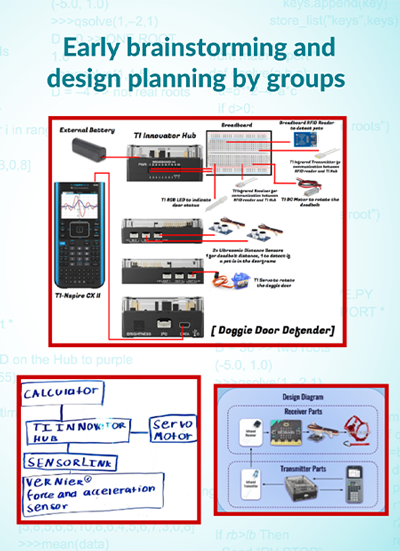
Finally, students must present their ideas with a short video describing their innovation to be voted on by the public — effectively teaching students how to communicate their ideas to the judges and others.
By leveraging their creativity, they learn some valuable marketing strategies as well. It is obvious that students will go the distance to differentiate their product and their team!
You can see all 2022 finalists videos here.

The students have spoken — the TI Codes Contest is a win!

We recently spoke to some of the 2022 contest finalists to hear their opinions on the contest and what they learned from it.*
The teams that shared their experiences were:
- ThePetSaviors — Dougherty Valley High School, San Ramon, California (coached by Alia Khatoon)
- NaviGator — Southern California Yeshiva High School, San Diego, California (coached by Debbie Moss)
- Brookwood BITES — Brookwood High School, Lawrenceville, Georgia (coached by Stephen Griffith)
- Stiles Middle School — Stiles Middle School, Leander, Texas (coached by Monica Walker)
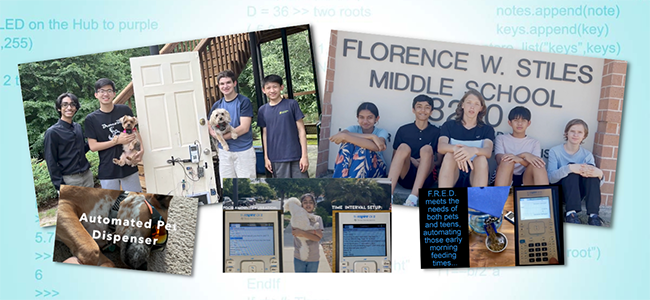
For the most recent contest in spring of 2022, the student teams had to imagine and design a solution that automates or optimizes something related to pets or animals.
Q: What was your favorite thing about the TI Codes Contest?
“My favorite thing about the TI Codes Contest was overcoming the initial problems. The success felt after a hard obstacle is a great feeling.” — NaviGator
- Building a working model of the group idea. It was invigorating to execute the vision that we had. (NaviGator)
- I really enjoyed the critical thinking put into the project’s programming and building portions. I took a more intricate approach to solving potential problems with our model: working backward. I found potential problems and worked backward to prevent them from occurring. I enjoyed the thought and time that my team was able to collectivize and create an efficient solution to the problem. (ThePetSaviors)
- Working with friends to create something that can help the world. (Stiles Middle School)
Q: How did you think of (the idea for) your project?
“We thought of the issue of feeding animals while their owners are away, something our classmates struggled with sometimes.” — NaviGator
- How we thought of our idea for the project was based off of a motive that we had to increase the amount of time sleeping. (NaviGator)
- We bounced ideas off of each other for a few days until we eventually decided between two. We did a poll with the whole school which ended with our final idea as the result. (Stiles Middle School)
- Based on the pet theme for this year, we first created a list of various pets that our group members had — dogs, turtles and fish. We also thought that many ideas related to helping turtles and fish would mean combining electronics with water, which would increase the complexity of whatever we decided to build, and given the rapid prototyping nature of this contest, that might be an issue. (Brookwood BITES)
Q: What technical and non-technical things did you learn during the project?
“Definitely time management. A lot of the project seemed like it would take a short amount of time but actually ended up taking longer than expected.” — ThePetSaviors
- Videos showing off your project in action are much harder to make than the videos look. (NaviGator)
- I learned that no matter how good an individual is at engineering or coding it takes the whole team effort to place well in the contest. (NaviGator)
- Never underestimate the simple things. Leaving the one simple thing for last is never a good idea. (NaviGator)
- Programming an RFID reader to identify different RFID tags. (Brookwood BITES)
- Discovered new troubleshooting workflows that make it easier to break down a problem into many small parts and identify which one is not working. (Brookwood BITES)
- Creating breadboard schematics. (Brookwood BITES)
- How to work efficiently while working remotely. For a significant duration of the project, we had three team members in U.S. Eastern time zone, one member in U.S. Pacific time zone, and one member in Central European summer time zone. We also had to practice remote troubleshooting a couple times, so we needed to take lots of organized, detailed pictures in order for other team members to get an idea of what the state of the robot is even though they’re not physically there. (Brookwood BITES)
Q: What advice would you give to another student about participating in a future TI Codes Contest?
“Plan in detail the materials, amounts and process you will use to build your project to save trips to the store and money overall.” — NaviGator
- Get used to troubleshooting. You are probably going to have to try something tens of times before it actually works, so get familiar with troubleshooting. Work backwards from the end effect (maybe a motor turning on or a light sensor detecting light), and start separating the process into multiple parts. Insert “debugging” steps in between these parts. This may seem counterintuitive because when adding debugging stages, you’re not working on hardware that will make it onto the final robot, but it’s still useful. (Brookwood BITES)
- Do it with friends and have fun with the building and coding. (NaviGator)
- PARTICIPATE. (NaviGator)
- I would say that it’s best to understand that the project doesn’t need to be stressful. The whole process is broken into parts already, so setting deadlines accordingly isn’t a problem. Don’t think too hard about it, and just try what makes sense. (ThePetSaviors)
- Find what works best for the group and not just you. If you get the whole team on board, it will stop the chances of someone doing the project alone. (Stiles Middle School)
- Try to get your work done fast and stay focused. (Stiles Middle School)
- Sometimes simpler ideas are better. (Stiles Middle School)

The teachers have spoken too — TI Codes is an official win-win!
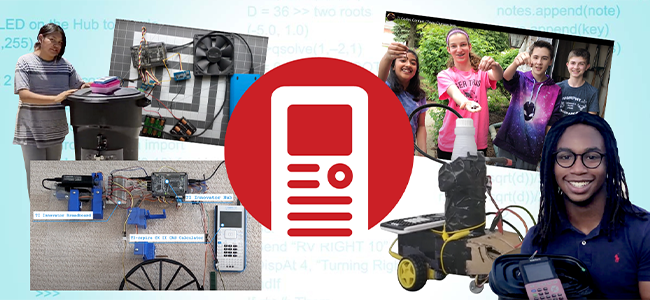
Over the years, we have heard from many teachers about the different things they have learned from their participation in the contest. These include the technical skills like coding, but also life skills like teamwork, open-ended problem-solving, project management and budgeting.
Q: What did you see your students learn from this project?
“The most important thing I saw them learn was self-reliance.” — NaviGator
- Apart from learning technical details and programming of the microprocessor, the students learned many important lessons about time management and teamwork. (ThePetSaviors)
- I was out of the country and worked very little with them. I gave them deadlines for tasks and answered questions if they had them, but other than that, they were completely on their own as far as generating ideas and solving problems, which was new for many of them (even though they were all seniors). (NaviGator)
- I believe the students learned the value of using a design process to come up with a solution to the problem. (Stiles Middle School)
Q: What was your favorite thing about the TI Codes Contest?
“I like how the contest was divided into many stages. That made the load of the work very manageable.” — ThePetSaviors
- I love how excited the TI experts are to work with the students, and how excited the students are to work with the experts. Every year they (the experts) say something, or many somethings, that absolutely changes the direction the students are going and moves the project from impossible to possible. Everyone should have that opportunity. (NaviGator)
- I liked that the project required the students to write code for use on a physical device. (Stiles Middle School)
Q: What advice would you give to teachers thinking about entering next year?
“ENTER THIS CONTEST! Don’t even worry about ‘what comes next?’ or ‘how will I have time to do the second and third rounds?’ You can get as much or as little out of the contest as you want, and if the only reason you enter is for the first round paragraph writing, that’s still a great reason!” — NaviGator
- If you have any background in project management (for example a PMP certification), then you are the perfect person to be coaching a student team. The most important thing you can do for students is show them how to work against a schedule, work backwards from deadlines, and yes, even read a Gantt chart. But other skills are helpful too, like if you are a drama teacher, or a graphic arts teacher, and you want to focus on the sales side, your team can pitch a very simple design and win it all with the video and the branding. There’s no one way to get to the finals. (NaviGator)
- Ask your students to spend some quality time in Round 1 to really decide on a good idea. So much of this competition hinges on having a good quality idea, and if you find a really good problem to solve (and not create a problem artificially just to have something to submit) then it’ll really make your team’s life easier in later rounds. (Brookwood BITES)
- I would say, definitely encourage your team to apply for this contest. Teachers or coaches should make a timeline and encourage the team members to adhere to it. If students do it over the summer, this will be a very nice bonding experience since it needs a lot of collaboration and interaction. It will be a lot of fun! (ThePetSaviors)
- I would advise teachers to have their students use the design process to develop the solution to the required task. (Stiles Middle School)

So … how do I start?
First off, watch the videos from the latest year’s participants and see the engagement, teamwork and problem-solving skills that all of these teams demonstrated.
Then, be on the lookout for the sixth annual TI Codes Contest announcement (set to launch sometime late fall or early spring). If you can’t wait or want to start small, check out our blog on “How to Host Your Own TI Codes Contest.”
Want to get a taste and build some skills and confidence for your students to participate in the next contest? We have awesome, project-based STEM activities where students can start using (or expand their skill set on) a variety of TI sensors and peripherals!
Regardless of where you are, we hope this blog inspires you to encourage your students to give this contest a shot, so they too can learn and grow like the teams from years past!
About the author: Harshal S. Chhaya is a systems engineer for TI’s educational STEM products. He also leads the company’s robotics outreach programs and works with partners to increase student participation in STEM and robotics competitions. He believes strongly that engineering competitions like the TI Codes Contest equip students in important areas like problem-solving, teamwork and presentation skills that help them in higher education. Chhaya enjoys using advanced engineering to make education fun and engaging for students and teachers. He is on Twitter at @hschhaya.
*Responses have been edited to fit the flow of this blog article.
